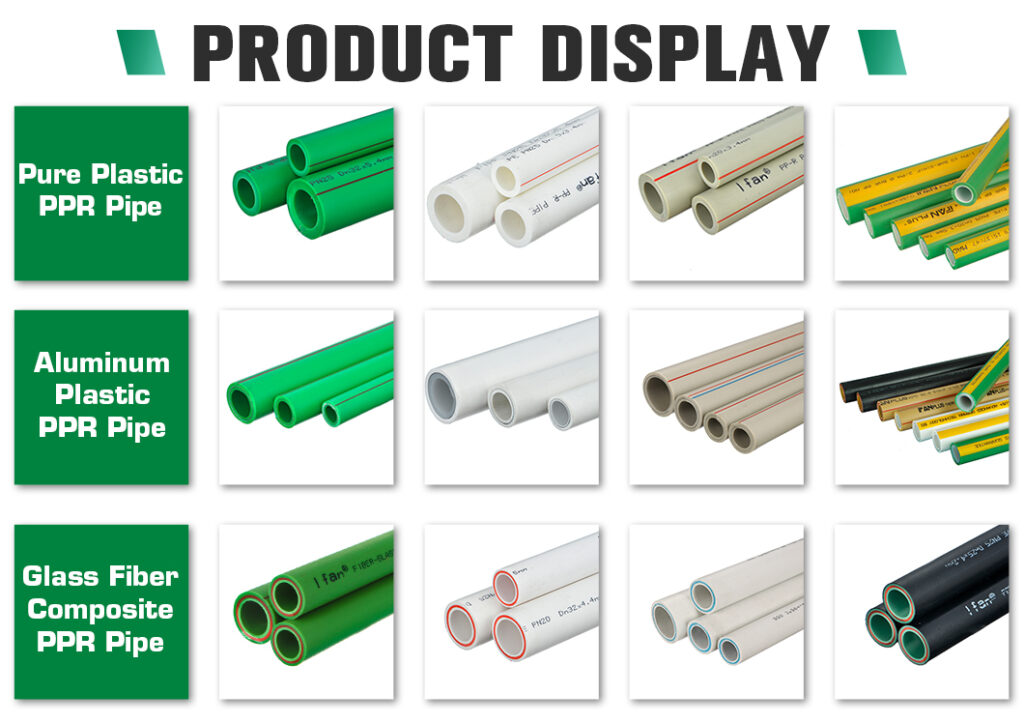Introduction
The Applications and Benefits of PPR Pipes in Plumbing,Polypropylene Random Copolymer (PPR) pipes are widely used in plumbing for their exceptional characteristics and numerous advantages. In this article, we will delve into the applications and benefits of PPR pipes in plumbing systems.IFAN factory 30+ years manufacture experience support color/size customization support free sample.Welcome to consult for catalog and free samples.This is our FacebookWebsite: www.facebook.com.
Applications
1. Hot and Cold Water Supply
One of the primary applications of PPR pipes is in the distribution of both hot and cold water. Their ability to withstand high temperatures makes them suitable for transporting hot water without warping or deteriorating.
2. Underfloor Heating Systems
PPR pipes are often chosen for underfloor heating systems. Their resistance to temperature extremes and durability ensures the longevity and efficiency of these systems.
3. Industrial Applications
PPR pipes are utilized in various industrial processes, where resistance to corrosion and the ability to withstand high temperatures are crucial. They are commonly used in chemical plants and factories.
4. Agricultural Irrigation
In agricultural settings, PPR pipes are employed for irrigation systems. Their corrosion resistance and durability make them a reliable choice for transporting water to crops.
5. Residential Plumbing
PPR pipes are extensively used in residential plumbing systems, including water supply and drainage. Their smooth inner surface helps maintain good water pressure, and leak-proof joints ensure water efficiency.

Benefits
1. Corrosion Resistance
PPR pipes do not corrode or rust, even when in contact with aggressive water. This corrosion resistance ensures the quality of water remains high.
2. Longevity
These pipes have a long lifespan, often exceeding 50 years when used within their recommended temperature and pressure limits. This results in less frequent replacements and maintenance.
3. Energy Efficiency
The smooth inner surface of PPR pipes reduces water friction, leading to more energy-efficient plumbing systems.
4. Environmental Friendliness
PPR pipes are 100% recyclable, and their production has a lower carbon footprint compared to some other materials, making them an eco-friendly choice.
5. Low Maintenance
PPR pipes require minimal maintenance because they are not prone to scaling or sediment buildup. This reduces the need for regular cleaning or maintenance.
6. Leak-Proof Joints
The heat fusion jointing method used for PPR pipes creates leak-proof connections, eliminating the risk of water leakage and damage.
7. Easy Installation
PPR pipes are lightweight and easy to install, reducing labor costs and installation time.
Conclusion
PPR pipes have found applications in a wide range of plumbing scenarios, from residential water supply to industrial processes. Their corrosion resistance, longevity, energy efficiency, and low maintenance requirements make them a cost-effective and sustainable choice for plumbing systems. Whether you’re looking for a reliable solution for your home or an industrial facility, PPR pipes provide the durability and efficiency required for modern plumbing applications.

